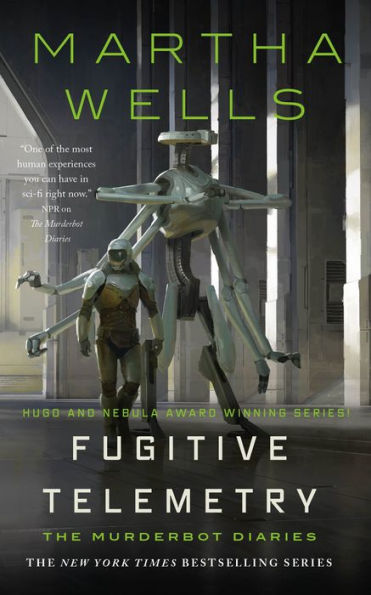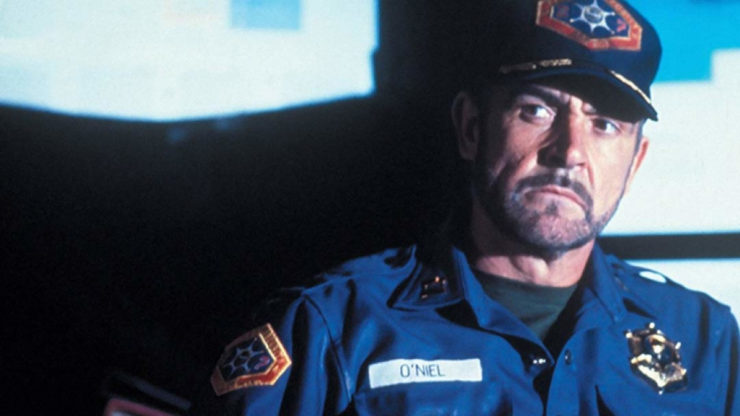Both Westerns and science fiction can be relevant and up-to-the-minute because they’re dislocated in time. George Orwell, Margaret Atwood, Octavia Butler, and many other writers have found it easier to write about their current dystopias by projecting them into the future; sometimes it’s easier to talk about what is happening right now by moving it forward a few years. By the same token, High Noon, released in 1952, was able to make its criticism of the Hollywood blacklist because that criticism was shoved back into an imaginary past.
Space westerns, though, look forward and backward at the same time, which makes it hard for them to speak quite as pointedly to their own day. The 1981 film Outland is a case in point: it’s a movie with stylish futuristic special effects, a love of the Western genre, and a garbled, ambivalent relationship to its own Reagan/Thatcherite present.
Outland’s director, Peter Hyams, originally conceived of the film as set in the old West. “I wanted to do a Western,” he explained in an Empire interview:
Everybody said, ‘You can’t do a Western; Westerns are dead; nobody will do a Western’. I remember thinking it was weird that this genre that had endured for so long was just gone. But then I woke up and came to the conclusion—obviously after other people—that it was actually alive and well, but in outer space. I wanted to make a film about the frontier. Not the wonder of it or the glamour of it: I wanted to do something about Dodge City and how hard life was.
Rather than being set in a town on the American frontier, Outland is set on the remote moon of Io, circling Jupiter, where Marshal William O’Niel (Sean Connery) has just been assigned as the chief police officer on the mining colony. The position is remote, difficult, and miserable. O’Niel’s wife finds it unedurable,and leaves him with their son to make a home back on Earth. The miners themselves suffer from depression and isolation, and not infrequently kill themselves in dramatically gruesome ways. With the help of station doctor Marian Lazarus (Frances Sternhagen), O’Niel discovers that the miners are being pushed into psychosis by a synthetic amphetamine supplied by station bigwig Mark Sheppard (Peter Boyle) to encourage productivity.
O’Niel disposes of Sheppard’s goons, but the chief sends for two hired killers, who arrive on a shuttle. O’Niel tried to enlist aid from his deputies and other people on the station, but they all refuse. But with Lazarus’ help, he manages to kill the assassins, defeat Sheppard, and restore order and harmony before leaving the station to be reunited with his wife.
Buy the Book


Fugitive Telemetry
That last bit of the plot, with the hired killers, is a direct lift from High Noon, one of the most critically acclaimed and popular Westerns of all time. As mentioned above, High Noon was seen in its own day as a comment on the Hollywood blacklist. It speaks to the general moral collapse and abnegation of America in general, and of the film industry specifically.
Writer Carl Foreman, a former member of the Communist party, refused to identify fellow members before Congress, and producer Stanley Kramer forced him to sell his partnership share in the film. The plot becomes a commentary on its own creation. Gary Cooper as Marshall Will Kane strides through the movie, his face lined with worry and betrayal, as his deputy, his neighbors, and even his wife abandon him, some out of personal animosity, some because they think his failure will advance their careers, some out of fear. He wins, because the good guy always wins in Hollywood—but rarely has a victory looked so much like defeat. Kaine, the outlaws vanquished, throws his star in the dust and rides out of town, just as Foreman left for England, all too aware that the place he’s tried to save would rather fall to the jackals.
High Noon takes place in real time, as Kane waits minute by minute for the vicious outlaw Frank Miller (Ian MacDonald) to arrive on the noon train. Its 85 minutes tick by like the painful grinding of an accelerating wheel. Outland, by contrast, doesn’t even start its clock till more than halfway through its 110 minutes; most of the plot churns by before the goons set out for the moon on the space shuttle. In High Noon, the doom that’s coming starts almost as soon as the film does; in Outland, there’s a much longer set-up. As a result, O’Niel doesn’t spend most of the movie searching for help in vain. Instead, he spends most of it investigating drug trafficking.
Drug use and trafficking were a major issue in 1981, when crime rates were rising and cocaine and crack were often blamed for the spike. So Hyams shoehorns the drug war into the place occupied by the blacklist in High Noon—with odd results. The blacklist was supported by the conservative government of the 1950s; High Noon is an indictment of that government’s moral weakness. In contrast, the conservative US and UK governments of the 1980s were rabidly anti-drug.
Hyams creates an alternative reality in which exploitive capitalists provide their workers with addictive substances to increase productivity. But in real life the exploitive capitalists used anti-drug policy as a way to intimidate and police marginalized populations and the workforce. High Noon excoriated America for its reactionary failure to defend its values, including free speech. Outland excoriates America for—not cracking down on drugs enough at the height of the drug war? It doesn’t make a lot of sense.
It doesn’t make much sense because it’s not necessarily supposed to make much sense. Hyams isn’t really focused on contemporary commentary. He’s focused on trying to capture the feel of those old Westerns—and especially of High Noon. His science-fiction film is a nostalgic effort to recapture the grit, the despair, the isolation, and the hard-hitting political allegory of an earlier time.
An earlier time’s hard-hitting political allegory doesn’t necessarily speak to one’s own moment, though, and so ceases to be quite as hard-hitting. Science fiction is well-known for its politically resonant dystopias, but it’s perhaps no accident that the best-known space western, Star Wars, is famously politically incoherent (what else can you say about a film that nicks its happy ending’s iconography from Triumph of the Will?) High Noon is one of Hollywood’s great movies because despite being set in the past, or thanks to being set there, it always knows exactly what time it is. Outland, vacillating between yesterday and tomorrow far out among the stars, never quite figures out what it has to say about its own contemporary moment.
Noah Berlatsky is the author of Wonder Woman: Bondage and Feminism in the Marston/Peter Comics (Rutgers University Press).










